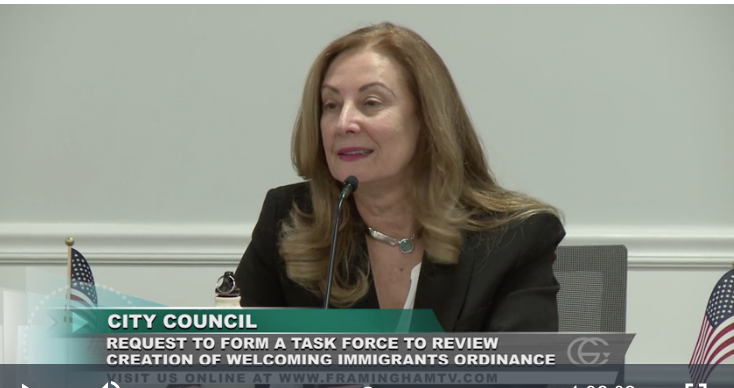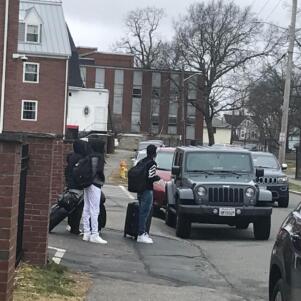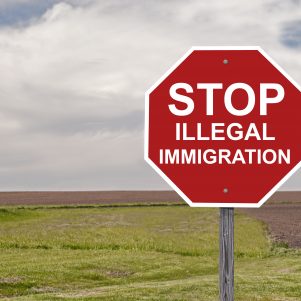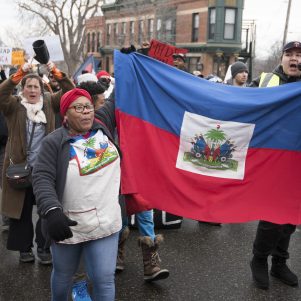Framingham To Study Sanctuary City Status;
Opponent Says Appoint ‘Angel Moms’ To Panel
By Matt McDonald | February 20, 2019, 23:11 EST
 Margareth Basilio Shepard, a member of the Framingham City Council in Framingham, Massachusetts, speaks about her Immigrant Welcoming resolution during the council meeting Tuesday, February 19, 2019.
Margareth Basilio Shepard, a member of the Framingham City Council in Framingham, Massachusetts, speaks about her Immigrant Welcoming resolution during the council meeting Tuesday, February 19, 2019. The Framingham City Council is creating a task force to study whether Framingham should declare itself a sanctuary city.
The panel, to be chaired by the mayor, is asked to study and perhaps propose what the resolution calls a Welcoming Immigrants Ordinance.
The resolution doesn’t create a sanctuary city and doesn’t spell out what the task force should recommend. But the resolution uses general language similar to what’s found in so-called trust ordinances, many of which also direct local police not to cooperate with federal immigration authorities unless they have a warrant.
Framingham has a large Brazilian population whose first language is Portuguese – one of the 75 languages spoken in Framingham public schools, local officials say.
Framingham is about 19 miles west of Boston. About 27 percent of Framingham’s population is foreign-born, according to the U.S. Census Bureau, out of about 72,000 people total. City officials are worried that illegal immigrants will be undercounted in the 2020 federal census if they avoid census takers out of fear of being deported, which may reduce the tally of the city’s population, which would reduce the amount of money the city gets from the state and federal governments.
City councilor Margareth Basilio Shepard, an immigrant from Brazil and former treasurer of the Framingham Democratic Town Committee (when Framingham was a town), proposed the task force.
“I’m presenting a resolution because Framingham has a diverse population,” Shepard said during the council meeting Tuesday night, according to a video published online by Framingham’s Government Channel. “We have different groups, different organizations. And the resolution for a task force will allow a dialogue, will allow us to work with what we have in common, and not what we have that separate us. I don’t like walls. I like to build bridge. That was my campaign slogan, and that’s what I’m trying to do.”
“And I’d like to assure everyone that there’s no hidden agenda on the resolutions,” she continued. “Some folks label me as the immigrant city councilor, the Brazilian city councilor, or the stronger immigration defensor. I like all those labels. But I’m also an American citizen. I’m also sitting on this council, not only to advocate for immigrants, but to advocate for our residents of our city.”
Heather Panahi, chairman of the MetroWest Commission on the Status of Women, told the city council her commission heard last May from people living with grim consequences from their uncertain legal status in the country, fearful of the federal Immigration and Customs Enforcement agency, known as ICE.
“Women are afraid to call 911 when they are physically or sexually abused by a partner,” Panahi said. “They are afraid to question or speak up to their landlords, who regularly threaten to evict them, for [the] bad behavior of their abusers. They are fearful of contacting police. They avoid taking their children to the doctor. They avoid attending school functions, or even walking their children to school, for the fear of being reported to ICE. There are even reports that ICE has been closely monitoring school bus stops in Framingham, as well as the courthouse. Women in Framingham are afraid to speak up to their bosses regarding workplace sexual harassment and pay inequity for fear of being reported, detained, and subsequently being deported. Framingham’s women should not have to live in constant fear for their lives and livelihoods.”
Ten people spoke in support of the task force during the council meeting Tuesday, February 19, including representatives from the Brazilian Women’s Group, the Brazilian American Center, the Brazilian Work Center, the Brazilian Defense Center, the Massachusetts Association of Portuguese Speakers, and the League of Women Voters. An immigration lawyer, a teacher, and a school administrator also spoke.
The only opponent was Joe Rizoli, a Framingham resident who wore a drab green Trump hat.
“Apparently, I must be the only American that wants to stand up for rule of law here,” Rizoli said.
He said that Shepard’s resolution isn’t about legal immigrants who follow the country’s rules, come here legally, and then seek citizenship.
“She’s not talking about that. What she is talking about are illegal immigrants who have no right to be in this country in the first place, who either have let their visas run out or they came here illegally through the border for various reasons, possibly are now here in debt servitude …” Rizoli said. “What Miss Shepard is doing is asking the city of Framingham to break federal law. Federal law, not Mr. Trump has anything to do with. This goes back to 1965, where a whole mess of other people have been involved. So it has nothing to do with Mr. Trump, the immigration laws that are on the books.”
“Legal immigrants have nothing to be in fear of in Framingham. It’s the illegals who have false licenses and documents that need Miss Shepard’s help,” he said.
Rizoli challenged city officials to think creatively when they appoint members to the task force.
“This task force that you’re getting up is a shill. You’re gonna get people on it that are just gonna checklist — you know what you should have on the task force? Have the angel moms on it. Do you know who the angel moms are? The angel moms are who Trump has been bringing to Washington whose children, parents, husbands, wives have been killed by illegal immigrants,” Rizoli said.
At that point city council chairman Dennis Giombetti attempted to interrupt him for talking off point.
“I’m telling you about the task force,” Rizoli said. “Because it’s gonna probably go through. Put angel moms on it – people that have been hurt from illegal immigrants. All I’ve heard is people placating for illegal immigrants. This town has been very welcoming to legal people. We run this town and all towns on rule of law. … We are a nation of rules, a nation of laws.”
Later in the meeting, Tiago Prado, who owns an insurance business, spoke in favor of the resolution. He told of his tough upbringing in East Boston after being brought to America from Brazil by his mother as a small child. He said he is now a U.S. citizen, and was fortunate to go to Tufts and work for a large bank on Wall Street.
“And eventually to realize my calling – it was just not the financial industry — and come back and say, ‘What good am I with my knowledge and education if I don’t share with my people?’ And I picked Framingham to start the insurance agency for one reason, I think we all agree on this: When we push people out into the darkness, we open the door to a black market. And that creates the possibility of additional crimes,” Prado said.
Immigration skeptics sometimes point to high rates of automobile insurance fraud in high-immigration communities like Lawrence, where dozens of people have been convicted of staging fake accidents in order to collect on fraudulent insurance claims. The problem, Prado said, are the circumstances immigrants find themselves in and their ignorance of the law.
“In the insurance business in Framingham, when I told Progressive that we wanted to open our first location right in downtown Framingham, they said, ‘You’re nuts.’ And I asked why, ‘Why?’ They said, ‘That’s the largest number of fraud in the state.’ And I said, ‘Well, we’re going to prove you wrong.’ People are trapped in this because they’re induced to. They were forced into this market,” Prado said. “And today we can successfully say that we work with Progressive to educate our clients so they can understand when they’re breaking the law, because for the most part they break the law not because they know.”
Framingham could use the immigrant-welcoming task force because it has not always been as welcoming as it might be, Prado said. He was offended by an experience he had several years ago when he was stopped by a police officer for a minor traffic offense while driving a vehicle with commercial license plates with another dark-skinned man in the vehicle. The police officer didn’t ask for Prado driver’s license but rather asked, “Do you have a license?” – as if a dark-skinned man driving a vehicle with commercial plates in Framingham likely wouldn’t have a driver’s license.
State Representative Maria Robinson (D-Framingham) told the city council that she and three other area state representatives support Shepard’s resolution. She also noted that legislators in the area are working on a bill that would make Massachusetts a sanctuary state, limiting cooperation between local and state law enforcement officers and federal immigration authorities.
The council voted 9-0 in favor of the resolution and to create the task force. (Two members were absent.)
Before the vote, city councilor Cheryl Tully Stoll said she hopes the task force will educate people about what immigrants’ lives are like. She noted that Rizoli’s viewpoint is not rare in Framingham.
“And until we are able to have people understand other issues and put themselves in other people’s shoes, we don’t have a chance of changing points of views, or making them a little more informed, or a little more educated,” Tully Stoll said.
Shepard agreed with that point, and said city officials ought to seek out varying points of view, even ones she disagrees with.
“Mr. Rizoli has a point. He has a right to speak, and he has a point. If we close our eyes and our ears to shut down that view, we are not reaching out for the others. And there are some people who are not as extreme as Mr. Rizoli, but who also have questions, who also don’t understand,” Shepard said.
She identified ignorance of immigrants’ lives as a common problem.
She said that at one meeting she attended after she was elected to the new city council in November 2018, “One resident could not shake my hand, because she was afraid, she thought I would bring her disease. So I didn’t judge that person. She’s not wrong. What’s wrong is the misinformation, that’s what is wrong.”
She noted that illegal immigrants generally don’t currently have a path to citizenship in the United States, which hasn’t offered a general amnesty for people living in the country illegally since 1986.
“In most of the meetings people ask, ‘Why you people don’t become a citizen?’ They have no idea that for 20 years there’s no way that anybody can become legal in this country,” Shepard said. “And that is the major issue – information. We need to find that space, and we need to educate the people.”











